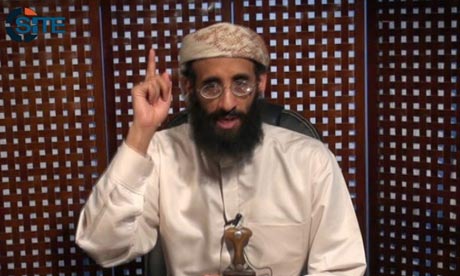Leaked Obama administration memo sets out case for killing US citizens
Lawyers give 'rules' on killing senior al-Qaida members, and seek to justify drone attacks abroad

Anwar al-Awlaki was killed in a US drone strike in Yemen in 2011. Photograph: EPA
The detailed circumstances in which a US government may order the killing of an American citizen who is a high-ranking member of al-Qaida have been revealed in a leaked memo prepared by Obama administration lawyers.
The document, acquired by NBC and dating from 2011, lays out for the first time the precise rationale for carrying out targeted killings of senior al-Qaida members who are US citizens, and who are believed to pose an "imminent threat of violent attack" against Amercia.
Although the white paper deals specifically with the issue of when and how the president can order the killing of a US citizen who is a member of al-Qaida, it also provides one of the most comprehensive accounts of the wider international legal framework the US believes supports its controversial drones policy.
Although the paper does not specify the "minimum legal requirements" for launching such an operation, it insists that the killing would be constitutionally justified as the United States is engaged in an "armed conflict", as defined by international law and authorised by Congress, with al-Qaida and its affiliates.
In a key passage in the document – which is unsigned – it argues that for a US citizen who has rights under the due process clause and the fourth amendment, "that individual's citizenship would not immunise from a lethal operation".
The paper concludes: "Where certain circumstances are met, a lethal operation against a US citizen who is a senior operational leader of al-Qaida … and who himself poses an imminent threat of violent attack against the United States, would not violate the constitution."
The leaking of the documents came as eight Democratic and three Republican senators wrote to Barack Obama requesting the disclosure of all the legal opinions drawn up at his request authorising the killing of Americans.
The question of the constitutionality of such operations emerged after the killing of Anwar al-Awlaki, a US-born radical Muslim cleric, in a drone strike in Yemen in September 2011. Although the leaked paper is not understood to be the legal determination that authorised that killing, it is understood to mirror it.
The paper argues that the operation must be consistent with the laws of war, and that capture of the individual must have be found to be unfeasible. But in a number of areas, it controversially appears to give considerable flexibility to administration officials to define key issues.
Those include defining the imminence of the specific threat and the operational seniority of the target, considerations outside of the overview of the US courts. The paper insists the decision to authorise a lethal operation may be made by an "informed, high-level official of the US government", rather than by the courts.
On the issue of imminence, the justification is particularly wide-reaching: as attacks are "continually" being planned by al-Qaida, it is argued, "imminence must incorporate considerations of the relevant window of opportunity."
The paper justifies the exclusion of the courts by arguing that "judicial enforcement of such orders would require the court to supervise inherently predictive judgments by the president and his national security advisers as to when and how to use force against a member of an enemy force against which Congress has authorised the use of force."
The leaking of the document, with its dense legal argument justifying the targeted killings of US citizens, is certain to escalate the arguments that have been swirling around the issue.
Speaking to the New York Times, Hina Shamsi, director of the American Civil Liberties Union's national security project, denounced the memorandum as "a profoundly disturbing document", adding: "It's hard to believe that it was produced in a democracy built on a system of checks and balances. It summarises in cold legal terms a stunning overreach of executive authority: the claimed power to declare Americans a threat and kill them, far from a recognised battlefield and without any judicial involvement."
No comments:
Post a Comment